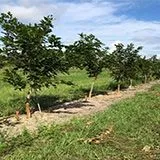Oilseed Crops
Primarily soybeans, and other crops such as peanuts, cottonseed, sunflower seed, flaxseed, safflower seed, rapeseed, sesame seed, castor beans, canola, rapeseed, and mustard seeds used to produce edible and/or inedible oils, as well as high-protein animal meal.
Oil-bearing crops or oil crops include both annual (usually called oilseeds) and perennial plants whose seeds, fruits or mesocarp and nuts are valued mainly for the edible or industrial oils that are extracted from them.
Narrower Topics
Carinata
UF/IFAS has been working to identify advanced genotypes of Brassica carinata (carinata) that will be profitable for cultivation as an oilseed crop in the southeastern US. Its high oil content and favorable fatty acid profile make it suitable for the biofuel industry as a biojet fuel. A near relative of collard and mustard, a variety developed by the Texas Agricultural Experiment Station in 1972 can be also be grown as a green leafy vegetable in Florida.
Pongamia
Millettia pannata
[header and thumbnail image: Pongamia spreading down a river in south Florida. Credit: Michael Sthreshley, UF/IFAS]

